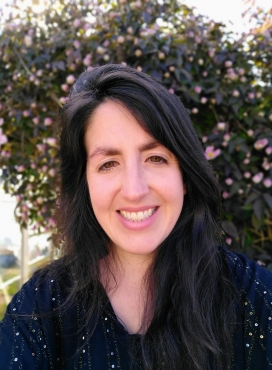Dr Jasmine Hunter Evans
Professional biography
Interdisciplinarity has always been central to my scholarship, research and teaching. I studied for a BA in English Literature and Ancient History and an MA in Ancient History at Cardiff University before completing an AHRC funded PhD in English Literature and Classics at the University of Exeter. Alongside teaching across the Humanities – with a focus on classical reception – I have lectured in Higher Education Practice, specialised in public engagement training, and led the development of researchers at Bath Spa University. I joined the Open University as a Staff Tutor and Lecturer in Classical Studies in April 2021.
Research interests
My research unites ancient and modern literature, visual artwork, cultural and political discourse, and intellectual history, through the ways in which the classical world, particularly ancient Rome, was reimagined across the nineteenth and twentieth centuries.
While I am fascinated by the reception of Rome and of Latin literature in the works of many writers, artists, historians and philosophers, my monograph focuses on the Anglo-Welsh, Catholic, First World War veteran David Jones (1895-1974). Across his drawings, watercolours, unique painted inscriptions, poetic fragments, letters and essays, Jones shaped his conception of modern Western civilisational decline on a creative and dynamic reimagining of ancient Rome. His vision of Rome was not founded on a classical education but fashioned instead from his engagement with contemporary dialogues surrounding Rome’s relationship with the modern world. In this way, Jones’s works become a lens through which we can explore Rome’s position in complex areas of twentieth-century discourse such as imperial rhetoric, cyclical history, the Catholic intellectual revival, and the Welsh nationalist movement.
Working across disciplines and engaging deeply with archives has led to my discovery of lost filmed interviews and the digitisation, public screening and sharing of new materials. Building on this research, I am currently collaborating on projects exploring innovations in archival methodologies and digital humanities, and developing publications on creative approaches to marginalia and fragmentation.
Selected Publications:
'Shifting Landscapes of War: Rome and 20th Century Disillusion', Journal of War and Culture Studies (forthcoming, 2025).
'Richard Shirley Smith', Practitioners' Voices in Classical Reception Studies, Issue 13 (2022).
David Jones and Rome: Reimagining the Decline of Western Civilisation (Oxford University Press: Classical Presences Series, 2022).
‘“The first experiences are the things that stay”: The Lost 1973 Mabon Studios Interview with David Jones’, in Henderson Staudt, Price-Owen and Berenato (eds.), David Jones on Religion, Politics and Culture: Unpublished Prose, Modernist Archive Series (London: Bloomsbury Academic, 2018), 269-303.
‘“The Agent”: Probing into Agency’, David Jones Special Issue, Religion & Literature 49. 1 (Spring 2018), 2-8.
‘Introduction: Towards a Theology of History’, David Jones Special Issue, Religion & Literature 49. 1 (Spring 2018), 2-8.
‘Bridging the Breaks: David Jones and the Continuity of Culture’, Flashpoint, no.18 (Summer 2016).
‘“You’re awfully unorthodox David”: Saunders Lewis’s Lost 1965 Film Interview with David Jones’, New Welsh Review (May 2014), 24-31.
Selected Conference Papers:
2022: 'The Place of Rome in David Jones's Imagination: A Contemplation of The Paschal Lamb (c.1951)', in The Poetics of Liturgy and Place (Durham University & University of Notre Dame).
2021: “History, they say, repeats herself”: Temporal Cycles in The Grail Mass’, in Mapping the Artist’s Mind: The Grail Mass, Modernism, and Inscription (Washington Adventist University Honors College).
2019: ‘Inscriptional Practice as Cultural Preservation’, in Theory of Art; Theory of Culture Conference (Georgetown University).
2018: ‘New Insights from Lost Footage’, in Historicizing Modernism / Modernist Archives Conference, (University of York).
2015: ‘Recovering Radical Reception’: Welsh Nationalism’s Claim that “Rome is our Mother”’, in the Classical Association Conference (University of Bristol).
2014: ‘David Jones’s vision of Passchendaele’, in British Poetry of the First World War, English Association Conference (Wadham College, Oxford).
2014: ‘Re-imagining Rome at the Fall of Western Civilisation: David Jones and the Analogy of Decline’, in Classics and Classicists in the First World War Conference (University of Leeds).
Teaching interests
Due to my interdisciplinary specialism, I have lectured on a wide variety of Latin and Greek literature and on Roman history across Classics, English Literature and History, in particular tracing the reception of classical texts, ideas and artworks from the ancient world to the modern. I am currently working on the MA in Classical Studies (A863 & A864) and the interdisciplinary Level 1 module A111: Discovering the Arts and Humanities. My authored materials are part of A350: Greek and Roman Myth and our new MA in Classical Studies (A868).
Alongside my work in the Humanities, I have led MA modules in Education and professional development programmes for staff and postgraduate researchers. My interest in pedagogy led me to undertake the HEA’s Teaching Excellence Programme (2018) and complete both SFHEA accreditation and an MA in Professional Practice in Higher Education in 2021.
My scholarship on communal writing practices, and role as a trained writing retreat facilitator, has enabled me to lead a diverse range of initiatives for staff and postgraduate researchers and to produce materials for the Arts and Humanities Writing Centre. I'm also involved in a funded scholarship project, 'Write Now', embedding writing workshops into undergraduate programmes.
Impact and engagement
My longstanding expertise as a trainer in public engagement, impact and co-production enables me to facilitate workshops for a variety of communities. I have worked as a consultant, for example, designing and leading programmes as part of the National Co-ordinating Centre for Public Engagement’s Associates Network. Alongside my work as a trainer, I lead an international Open Societal Challenges funded project on enhancing engagement with digital archival exhibitions ('Opening the Archives') in collaboration with the National Library of Wales, Cambridge Digital Humanities and the David Jones Research Center.
